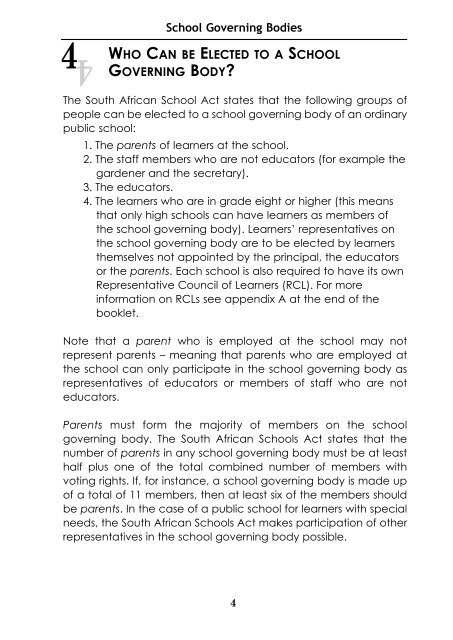School Governing Bodies - Education Rights Project
School Governing Bodies - Education Rights Project
School Governing Bodies - Education Rights Project
Create successful ePaper yourself
Turn your PDF publications into a flip-book with our unique Google optimized e-Paper software.
44<br />
<strong>School</strong> <strong>Governing</strong> <strong>Bodies</strong><br />
WHO CAN BE ELECTED TO A SCHOOL<br />
GOVERNING BODY?<br />
The South African <strong>School</strong> Act states that the following groups of<br />
people can be elected to a school governing body of an ordinary<br />
public school:<br />
1. The parents of learners at the school.<br />
2. The staff members who are not educators (for example the<br />
gardener and the secretary).<br />
3. The educators.<br />
4. The learners who are in grade eight or higher (this means<br />
that only high schools can have learners as members of<br />
the school governing body). Learners’ representatives on<br />
the school governing body are to be elected by learners<br />
themselves not appointed by the principal, the educators<br />
or the parents. Each school is also required to have its own<br />
Representative Council of Learners (RCL). For more<br />
information on RCLs see appendix A at the end of the<br />
booklet.<br />
Note that a parent who is employed at the school may not<br />
represent parents – meaning that parents who are employed at<br />
the school can only participate in the school governing body as<br />
representatives of educators or members of staff who are not<br />
educators.<br />
Parents must form the majority of members on the school<br />
governing body. The South African <strong>School</strong>s Act states that the<br />
number of parents in any school governing body must be at least<br />
half plus one of the total combined number of members with<br />
voting rights. If, for instance, a school governing body is made up<br />
of a total of 11 members, then at least six of the members should<br />
be parents. In the case of a public school for learners with special<br />
needs, the South African <strong>School</strong>s Act makes participation of other<br />
representatives in the school governing body possible.<br />
4


